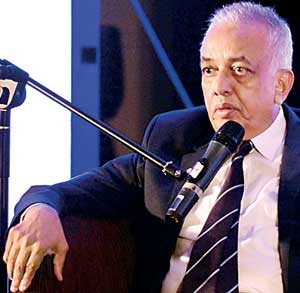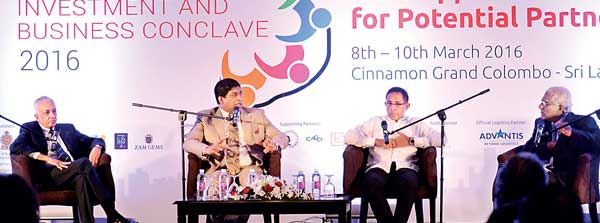Reply To:
Name - Reply Comment

In t e r n a t i o n a l Tr a d e an d Development Strategies Minister Malik Samarawickrama yesterday expressed confidence in Sri Lanka’s relationship with China continuing on a much firmer and stronger footing with the prevailing issues being successfully ironed out.
“We discussed all the outstanding issues and all of them have been resolved. Now it is all about systems as far as China is concerned,” said Samarawickrama during the Ceylon Chamber’s Investment and Business Conclave 2016, giving an update on his recent visit to that country.
Elaborating on the details, he shared that Sri Lanka had sorted out the differences with China on the major infrastructure projects entered into during the time of the previous regime. Samarawickrama said the b i g g e s t C h i n e s e v e n t u r e , the US $ 1.4 billion Port City real estate reclamation, would be given approval. “Very soon they can recommence. There will be few amendments to the original agreement, which can be done within the course of this month,” he stated. For the said project, land will not be on a free-hold basis but on a 99-year lease. The minister stated that once the land is filled, the whole project would operate under a joint venture between a Chinese company and the Sri Lankan government.
“That is another big change. We will then proceed with the agreement that is signed. There will be no issue on that,” said the minister confidently while adding that all other developments, such as the southern expressway, the extension to Kataragama and the water projects, among others would continue.
During his visit, the minister said the Chinese investors were convinced to work on the “huge white elephants”, the Hambantota airport and seaport, on a joint venture basis. The investors have agreed to forward proposals for the same within the next few weeks. Furthermore, the Chinese investors will also be setting up an industrial zone of 1000 acres in Hambantota.
“All this will help develop the country and at least the finance minister will have some income to pay off the debt,” noted Samarawickrama. Samarawickrama was in China earlier this month to set the foundation for Prime Minister Ranil Wickremesinghe’s oncoming visit to the country from April 7 to 8.

A panel discussion in progress at the Ceylon Chamber’s Investment and Business Conclave 2016: From left: International Trade and Development Strategies Minister Malik Samarawickrama, Finance Minister Ravi Karunanayake, Public Enterprise
Development Minister Kabir Hashim and Senior Advisor to International Trade Minister Dr. Indrajit Coomaraswamy
Pix by Pradeep Pathirana
Expecting to put an end to the hue and cry made against the proposed Economic and Technical Cooperation Agreement (ETCA) by various quarters, Minister Samarawickrama yesterday affirmed the trade pact would only be inked after consulting all the stakeholders and ensuring it is favourable to Sri Lanka. “We know exactly what we want but the discussion will take place over a period of time. We will naturally consult all the stakeholders: the professionals, chambers, trade unions and even the opposition members of parliament, and only then will we come to a conclusion,” Minister Samarawickrama said. “No doubt the agreement will be favourable to us. We are aware of the asymmetry between the two countries. We will address those issues and I am sure we can have an agreement that is favourable to us; that will help increase our exports,” he added.
Over the recent months, professional bodies and representatives across diverse sectors have openly criticised and expressed fears over the government entering into an agreement without taking into account their concerns.
The lack of transparency in the whole process from the government’s side has aggravated the situation. Samarawickrama revealed that Lanka had put forward to India its framework for the trade pact, for which feedback is yet to be received. The Indian government is expected to send in its views and framework within the next few weeks.
The minister stressed that proper negotiation could only kick off once both countries have exchanged their outlines of the agreement and till then no decision could or would be made. The draft sent to India excludes Mode 4 — the free movement of persons — the most controversial pillar as far as trade in services is concerned. “This is a decision we took. But, in 2008, the IT and shipbuilding sectors had made a request to open these industries so they could have skilled people and get technology from India. This we will look at; (we will) talk to the respective chambers and see how we can accommodate their needs,” said Samarawickrama. However, it is the local IT sector that has been vocal against the possible flow of Indian professionals as a result of the proposed trade pact. According to associations such as the Computer Society of Sri Lanka (CSSL), Development Strategies and International Trade Ministry has been well informed of its views and concerns in this regard, although not acknowledged. Nevertheless, Samarawickrama opined that as the trade pact with India would not only be for trade but also for technology, as well as training, it is important for Sri Lanka.
“We are well aware that India is advanced in IT-enabled services. We have a lot to learn from them, so we will need their assistance for a while. It is on that basis that we are looking at this agreement,” he said. The minister also noted that China has expressed keenness in the finalisation of the ETCA with India as for them it will be a gateway to enter the diverse and large market.